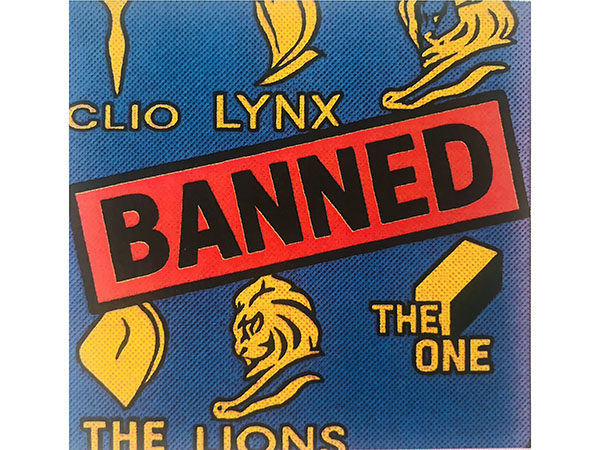Industry Talk - Top Stories
On Advertising Awards and Selective Sanctions
by Iain Akerman
May 31, 2025
.jpg) Advertisement
AdvertisementAdland’s two biggest awards shows continue to ban Russian entries, while failing to exclude Israel. Why are political decisions being inconsistently applied?
Three years ago, both D&AD and Cannes Lions barred Russian entries and delegates in response to Russia’s invasion of Ukraine. D&AD, which had initially planned to accept Russian submissions, reversed its decision as the conflict escalated, removing all Russian entries from its awards programmes. Similarly, Cannes Lions announced it would not accept submissions or delegations from Russian agencies or brands. These bans are still in place.
Similar action has not been taken against Israel, despite Amnesty International concluding that Israel is committing genocide against Palestinians in Gaza.
Last October, the UN Independent International Commission of Inquiry on the Occupied Palestinian Territory stated that Israel is “committing war crimes and the crime against humanity of extermination with relentless and deliberate attacks on medical personnel and facilities”. This followed an interim judgement by the International Court of Justice (ICJ), which found it to be ‘plausible’ that Israel is violating its obligations under the Genocide Convention.
The ICJ also issued a landmark ruling in July last year, declaring that Israel’s occupation of Gaza and the West Bank, including East Jerusalem, is unlawful.
Despite the international condemnations, both D&AD and the Cannes Lions International Festival of Creativity have refused to take any measures against Israeli entries and delegates. In contrast, they continue to sanction Russia.
“It’s pure double standards and hypocrisy, but someone high up is twisting their arms,” believes Toufic Beyhum, a freelance executive creative director based in the UK.
“Who exactly? That’s what I am trying to find out. It seems that everyone is aligned with the same double standards, from Eurovision to the tennis ATP. The ATP, for example, doesn’t ban Russians from playing but they childishly don’t place Russian flags next to their names. Yet I have seen several Israeli tennis players compete with their flags.”
In response to a request for comment, D&AD did not reply. Cannes Lions issued this statement: “As a business, we have committed to maintaining a neutral stance, in line with international sanctions. Cannes Lions seeks to connect and inspire people from all over the world, supporting them to use creativity for good. With that neutrality in mind, we allow speakers, delegates and entries from all backgrounds to attend and enter Cannes Lions, except those where there are international sanctions in place that prevent us from doing so.”
“I was told by someone very high up at D&AD that they were watching the situation closely and reviewing it internally,” says Beyhum. “They gave me the excuse that Putin has an arrest warrant (which justifies banning Russian entries) and Netanyahu does not. This was back in May 2024. When the arrest warrant was issued by the ICC for Netanyahu in November 2024, I sent a message pointing that out, yet they still did not ban Israeli agencies. In fact, they ignored my messages. I have lost all respect for what used to be my favourite awards show, and it really makes me question what other politics these awards shows play.”
Such hypocrisy aligns with an erosion of trust in the international rules-based order. Gaza has exposed deep contradictions in global governance, with the selective application of international law and a complete disregard for institutions such as the UN and the ICC. As H.A. Hellyer, a senior associate fellow at the Royal United Services Institute, a UK-based think tank, told Al Jazeera: “We can’t claim to uphold a rules-based order when it comes to Ukraine, bemoaning America’s failure to stand by it, for example, but then allow for a complete abrogation of that order when it comes to Gaza.”
The majority of creatives would argue that no agencies should be banned from awards shows, including Beyhum, who believes “creatives have nothing to do with dirty politics”. But if award shows choose to engage in politics, they must do so fairly. “If they do decide to play politics, then they really are opening a can of worms for themselves because where do you draw the line?” asks Beyhum. “Should the US be banned for selling weapons to Israel, for example, or should the US and the UK be banned for illegally invading Iraq?”
“Obviously, everyone wants consistency because without consistency we have hypocrisy,” says Seyoan Vela, chief creative officer at Dubai-based Livingroom. “But how then does advertising – and even more ironically advertising awards shows – become the guardian and guiding light of moral and ethical standards? Where is the line drawn in a continually unjust world? This may be a slightly contrarian view but should any country be banned? Doesn’t isolation just lead to an entrenching of views and more extremism? Surely, we should be exposing people from nations that we may have deep-held differences with to opinions that they may never receive at home.
“I believe creative people in general have open minds and good hearts and if we want to effect change, we should embrace the challenge of changing people’s mindsets. After all isn’t that what advertising does better than anything else – persuasion. As a footnote, I feel that No Other Land’s Oscar win was made more powerful and amplified by there being no bans. No one could claim a hidden agenda or conspiracy.”
There is, of course, little creatives can do to counter such hypocrisy, apart from insisting their work not be entered. Even then they are likely to be overruled. All the major holding groups have agencies in Israel (Publicis Groupe, for example, has over 400 staff in Tel Aviv), and, in all likelihood, Gaza will not be mentioned at any of this year’s awards shows. In contrast, WPP, IPG, Omnicom, and Publicis no longer operate in Russia. In reality, only independent agencies will be able to take a stand. Even then, the temptation of personal gain and professional prestige will likely outweigh any sympathy for Palestine.
“If you run an agency in the Middle East, please ask yourself why D&AD is giving Ukrainians free entry but not Palestinians and Lebanese,” says Beyhum. “Both countries have also been illegally invaded. Lebanon has most of the network agencies in Beirut and was affected by Israel’s bombing of the country, yet no one reached out to them. Did Iraqis get free D&AD entries when the UK and the US illegally invaded their country? This is what I mean by opening a can of worms. Stick to being a creative awards show.”



.jpg)





